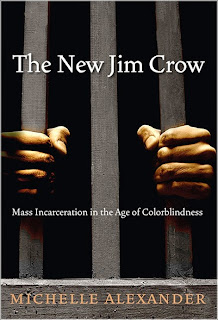My Dungeon Shook and My Chains Fell Off
A democratic society requires mature, public conversation about issues of importance. Facebook CEO Mark Zuckerberg has convoked "A Year of Books" to offer such an opportunity. This commentary is part of a series of commentaries on each of the readings proposed by Zuckerberg. My commentary on Michelle Alexander's The New Jim Crow: Mass Incarceration in the Age of Colorblindness will have multiple entries for this truly remarkable book. This is the fourth of those entries.
Having described something of the argument constructed by Michelle Alexander in The New Jim Crow in previous blog entries, here we will take a look at her stirring final chapter, "The Fire This Time." Alluding to James Baldwin's The Fire Next Time, a 1963 book consisting of a pair of essays. In this chapter, Alexander argues that only a major social movement to end mass incarceration with "an ethic of genuine care" for all persons will end the succession of racial caste systems in the U.S. (18-19). In this concluding chapter, she aims to offer "conversation starters" that challenge "conventional wisdom or traditional strategies" (229).
 It is "blindness and indifference to racial groups" that is more powerful in this caste system than racial hostility. The people who uphold racial caste systems often are good, decent people, but, citing Martin Luther King, Jr., "They were victims of a spiritual and intellectual blindness. They knew not what they did" (241).
It is "blindness and indifference to racial groups" that is more powerful in this caste system than racial hostility. The people who uphold racial caste systems often are good, decent people, but, citing Martin Luther King, Jr., "They were victims of a spiritual and intellectual blindness. They knew not what they did" (241).
As I noted in a previous post, Jesus discovered that it is easier to give sight to the blind (Mt 20:29-34, Mk 8:22-25, Mk 10:46-52, Lk 18:35-43, Jn 9) than to open the eyes of those who think that they can see (Mt 23:26, Jn 9:40). Jesus would ask his own disciples: "Do you have eyes and not see, ears and not hear?" (Mk 8:18).
To end the new racial caste, we need to see in color.
This final chapter, "meant to be the beginning of a conversation, not an end" (229), lays out a challenging vision for those of us who hope to build a more just world. This is a significant work that deserves a lot of conversation and reflection. I write on the last day of May, the same day that the Washington Post reports that almost 400 people have been killed nationwide in police shootings. I can only offer my strongest recommendation to read this book. It will offer, quite likely a new way of seeing, and it urges, then, a new way of acting. May we have the vision to see and the courage to act.
Additional commentaries on The New Jim Crow:
Having described something of the argument constructed by Michelle Alexander in The New Jim Crow in previous blog entries, here we will take a look at her stirring final chapter, "The Fire This Time." Alluding to James Baldwin's The Fire Next Time, a 1963 book consisting of a pair of essays. In this chapter, Alexander argues that only a major social movement to end mass incarceration with "an ethic of genuine care" for all persons will end the succession of racial caste systems in the U.S. (18-19). In this concluding chapter, she aims to offer "conversation starters" that challenge "conventional wisdom or traditional strategies" (229).
Rethinking Denial-- Or, Where Are Civil Rights Advocates When You Need Them?
Alexander argues that "collective denial" of the racial caste system is "a major stumbling block to public understanding of the role of race in our society." This denial is not just in well meaning persons who are white, but also in in the the "awkward silence" of the civil rights community toward recognizing mass incarceration as the new caste system (223). By preferring to tell "stories or racial injustice that will evoke sympathy among whites," like Rosa Parks and "innocent doctors and lawyers stopped and searched on freeways," the civil rights community thereby reinforces the system that creates mass incarceration. The only way way to end the new caste system is to "embrace those who are most oppressed by it." Alexander proposes telling their stories so as to dismantle the New Jim Crow (227-229).
Tinkering Is For Mechanics, No Racial-Justice Advocates
A handful of reforms, argues Alexander, will not be enough. "We run the risk of winning isolated battles but losing the larger war," writes Alexander (236). The interests upholding the current system, like the Corrections Corporation of America, are too great. The financial incentives for law enforcement are too compelling. Alexander develops a lengthy list of areas needing reform and concludes that it cannot be reformed in a piecemeal fashion. She then argues that movement building and reform work go hand-in-hand. Alexander writes:[Brown v. Board of Education] did not end Jim Crow; a mass movement had to emerge first-- one that aimed to create a new public consensus opposed to the evils of Jim Crow. . . . But standing alone, Brown accomplished for African Americans little more than Abraham Lincoln's Emancipation Proclamation. A civil war had to be waged to end slavery; a mass movement was necessary to bring a formal end to Jim Crow. (235)One cannot expect that any less effort is necessary to end the new racial caste system.
Let's Talk About Race-- Resisting the Temptation of Colorblind Advocacy
Next, Alexander calls us to a new conversation about race: "we need to talk about race openly and honestly." This will be difficult, because, as she acknowledges, "Race makes people uncomfortable" (238). A colorblind argument "based purely on costs, crime rates, and the wisdom of drug treatment" will not accomplish the necessary changes (239). Real change requires facing the issues of race.
Against Colorblindness
In fact, colorblindness, argues Alexander, contributes to our blindness to the new racial caste system:Our blindness also prevents us from seeing the racial and structural divisions that persist in society: the segregated, unequal schools, the segregated jobless ghettos, and the segregated public discourse-- a public conversation that excludes the current pariah caste. . . . We have become blind, not so much to race, but to the existence of racial caste in America. (241).
 It is "blindness and indifference to racial groups" that is more powerful in this caste system than racial hostility. The people who uphold racial caste systems often are good, decent people, but, citing Martin Luther King, Jr., "They were victims of a spiritual and intellectual blindness. They knew not what they did" (241).
It is "blindness and indifference to racial groups" that is more powerful in this caste system than racial hostility. The people who uphold racial caste systems often are good, decent people, but, citing Martin Luther King, Jr., "They were victims of a spiritual and intellectual blindness. They knew not what they did" (241).As I noted in a previous post, Jesus discovered that it is easier to give sight to the blind (Mt 20:29-34, Mk 8:22-25, Mk 10:46-52, Lk 18:35-43, Jn 9) than to open the eyes of those who think that they can see (Mt 23:26, Jn 9:40). Jesus would ask his own disciples: "Do you have eyes and not see, ears and not hear?" (Mk 8:18).
To end the new racial caste, we need to see in color.
The Racial Bribe—Let's Give It Back
Boldly, Alexander then argues that affirmative action "has functioned more like a racial bribe than a tool of racial justice" (244). Comparing the year 1968 to the present, Alexander observes the existence of higher child poverty rates today and how unemployment rates in black communities rival those in developing countries (246). African American success stories, she argues, help to hide the new racial caste system (247-248).
Obama—the Promise and the Peril
In the previous section, Alexander notes how civil rights activists sometimes give "a more charitable spin" when the an offense is perpetrated by people of color with power, such as minority police officers, or they may be concerned about undermining a person in leadership like a black police chief. While President Barack Obama's election provides an enormous opportunity for the black community, Alexander notes that "This dynamic poses particular risks for racial justice advocacy during an Obama presidency" (251). In fact, she argues that the selection of individuals such as Joe Biden, Eric Holder, and Rahm Emanuel to serve in the administration as well as Obama's statements on the campaign trail and policy decisions once in office signal the continuance of mass incarceration and its incumbent racial caste system. It creates the perilous situation where "the very people who are most oppressed by the current caste system-- African Americans-- may be the least likely to want to challenge it" (253).
All of Us or None
Finally, Alexander concludes her argument trying to bring about the widest definition of "us," not simply black but also white and all others included. It requires an honest conversation about race to bring all together. Without the widest possible "us," racial caste will be perpetuated in some new form. Alexander writes:But if the movement that emerges to end mass incarceration does not meaningfully address the racial divisions and resentments that gave rise to mass incarceration, and if it fails to cultivate an ethic of genuine care, compassion and concern for every human being – of every class, race, and nationality – within our nation’s borders, including poor whites, who are often pitted against poor people of color, the collapse of mass incarceration will not mean the death of racial caste in America. Inevitably a new system of racialized social control will emerge. . . . No task is more urgent for racial justice today than ensuring that America’s current racial caste system is its last. (258)The dominant narrative must be reversed: "We must flip the script" (258). All of this is the work of movement building. Alexander concludes warning us "who hope to be their allies" that what we may hear when the incarcerated finally have voice to speak may well be rage. Speaking to that anger, Alexander quotes the conclusion of James Baldwin's The Fire Next Time (260-261).
This final chapter, "meant to be the beginning of a conversation, not an end" (229), lays out a challenging vision for those of us who hope to build a more just world. This is a significant work that deserves a lot of conversation and reflection. I write on the last day of May, the same day that the Washington Post reports that almost 400 people have been killed nationwide in police shootings. I can only offer my strongest recommendation to read this book. It will offer, quite likely a new way of seeing, and it urges, then, a new way of acting. May we have the vision to see and the courage to act.
Additional commentaries on The New Jim Crow:





Comments
Post a Comment